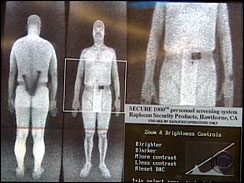Do The New, Tougher Airport Security Measures Violate Any Laws?
 If you’ve been reading the news this past week, you’ve probably stumbled across the news that the Transportation Security Administration (TSA) has started implementing more aggressive airport screening measures. If you hadn’t heard about this news yet (well, you know now), then you’re probably likely to encounter them sometime during your holiday travels as well.
If you’ve been reading the news this past week, you’ve probably stumbled across the news that the Transportation Security Administration (TSA) has started implementing more aggressive airport screening measures. If you hadn’t heard about this news yet (well, you know now), then you’re probably likely to encounter them sometime during your holiday travels as well.
Basically, in an effort to tighten airplane security, the TSA has started implementing two measures. The first measure is a sophisticated x-ray machine that all passengers must walk through. This machine uses very low doses of x-rays (as the TSA claims), and scans the passenger’s front and backside. The end result is a virtually “naked” image of the passenger.
The second measure allows TSA personnel to use more aggressive pat-down searches. Under the new guidelines, TSA agents may use their hands to touch the passenger’s genitalia and breasts in order to perform more detailed searches. These searches are required if the passenger opts not to go through the new “full-body” x-ray machine, sets off a metal detector, or if the machine detects suspicious activity.
In defense of these searches, the TSA says that these searches are performed by agents that are of the same gender as the passenger. Additionally, the searches are meant to be as effective as the full-body scanning machines, which is why they need to be as invasive as they are.
All of this has understandably prompted a large amount of outcry and debate by the American public. Most people find themselves on one side of the divide or the other. Those in favor of the new procedures say that these measures are worth it in order to ensure airplane safety. In addition, the TSA claims that it stores none of the images on the full-body scanning machine, thus helping to reduce privacy concerns.
Those opposed to the measures give a variety of reasons, the largest of them being that this is an invasion of privacy. Additionally, passengers are not thrilled about the longer wait lines that these measures will bring. (One article predicts that it will take up to five minutes for each passenger to go through the machine and be cleared). Other passengers are also wary about long-term radiation exposure from these x-ray machines.
Not surprisingly, several prominent people are calling for an end to these measures. This includes the ACLU and pilot Chesley “Sully” Sullenberger. But what exactly are the laws and rights associated with airport security?
1. Aviation and Transportation Security Act of 2001
The Aviation and Transportation Security Act of 2001 was enacted by Congress after the September 11, 2001 attacks, and created what we now know as the TSA. Before this Act, it was the responsibility of airline companies to deal with airport security. After this Act, power and responsibility was given to the TSA. It is under this Act that the TSA has now promulgated these new measures.
However, the TSA’s power under this Act is limited. For example, the TSA’s responsibility is to protect passengers against criminal violence or aircraft piracy. This means that they must check passengers for evidence of weapons or explosives. But, it is overstepping their bounds to check for regular criminal activity afoot, such as theft or drug importation.
2. Fourth Amendment protection against unreasonable searches and seizures
The 4th amendment is often cited in airport security cases. Basically, it guarantees people against unreasonable searches and seizures by the government. If the government is going to engage in such activity, it must have probable cause and must have obtained a warrant to do so
Early court decisions in the 1970’s established that airport searches did fall under the 4th amendment’s protection, as actions by airport search agents still constituted government action. However, courts still allowed airport searches to go on, despite the lack of individualized probable cause and warrant, by creating exceptions to the 4th amendment.
One of them was the Administrative Search Exception, which applies to searches made under a general regulatory scheme to further an “urgent federal interest.” Thus, airport searches to protect against terrorism and bomb threats clearly meet this requirement, and are exempt from the strict requirements of the 4th amendment. However, the searches must still be carried out in a reasonable fashion and with the minimum amount of intrusion necessary. It is on this last point that passengers opposing the new procedures may have the most compelling arguments.
To me, it doesn’t seem like the TSA has blatantly overstepped its boundaries in either of these new measures. However, courts can always decide otherwise, and lawyers can certainly give the TSA a good run for its money. In the meantime, I’m just hoping that the TSA hasn’t gone around to implementing one of these machines at my local airport yet.

Comments
how much do you fly donna? honestly, how can anyone say the TSA and DHS haven’t overstepped their boundaries with this mess!? the safety of these machines have not been established for cumulative exposure. also, what if they malfunction? we are dealing with x-rays and radiofrequency, both of which require the presence of a physician when used in medicine. It would make sense to spend the government money on additional air marshals to ensure safe flights rather than making a security theater like they’ve done. All of this is a total insult to our culture and human rights and I urge people to opt out in a professional manner and stand up for their rights so that these broken policies can be removed.